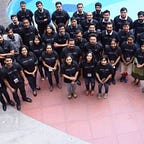#mywaterstory- Priyanand Agale
Dr. Priyanand Agale is the Founder of the Eco Needs Foundation, a “youth organization dedicated towards environmental conservation and an Eco-Revolution.” He’s also a professor at a government polytechnic institution. He and his team have been working at the grassroots level for years to address India’s growing water crisis and encourage people to save water.
Dr. Priyanand and his foundation have played a pivotal role in the restoration of various water bodies around Maharashtra. The Kham and Sukhna Rivers are two rivers flowing through Aurangabad city. It was becoming extremely contaminated as a result of domestic sewage and industrial wastewater discharges. Dr. Priyanand and his team began a river conservation campaign in 2011, in which the river was cleaned with the cooperation of local communities. They were also successful in obtaining a ban on effluent disposal into the river in 2015. Similarly, lakes such as Salim Ali Lake, Kamal Lake, Nehru Garden Lake, and Naher-E- Ambari (Historical water supply system to Aurangabad city) were experiencing pollution as a result of domestic wastewater discharge, waste disposal, and damage. The restoration process started by approaching government officials, organizing cleaning drives, desilting, and raising awareness among the local people. The Foundation has also collected data on water quality of 35 parameters at five locations over the last two years and generated a report for Godavari River protection in 2004. Dr. Priyanand and his Ph.D. guide Dr. Parag Sadgir invented a new method for domestic wastewater treatment and also received a patent from the Indian government for their wastewater treatment module, which does not require any machinery, chemicals, or electricity to operate.
Dr. Priyanand is most renowned for his role in developing Dhanora village into India’s first smart village. Along with Dr. Satyapal Singh Meena (IRS) to save water in Dhanora, he implemented the percolation tank link system. Three-kilometer-long canals connected eight percolation tanks in this system. He solved Dhanora’s water scarcity problem with this water conservation scheme. He also built a sewage treatment plant, which provides re-used water for various irrigation uses. It’s a one-of-a-kind model that makes use of zero — concrete. As a result, the cost of implementing this model is lower in comparison, and overall water conservation is higher.
Dr. Priyanand describes his childhood affinity to the environment and playing near rivers in his native village of Parsoda with fondness. When he went to a city school for higher education, he never seemed to be interested in the school and would wander off to a nearby river. As a result, his parents enrolled him in a school near the river. As a young student who had recently completed his tenth grade, he had approached the collector of his district, claiming that Bibi Ka Maqbara (historical monument) was becoming polluted because it was surrounded by brick kilns and that due to the emission of gases from these kilns, the monument’s white color was turning blackish. Brick kilns were relocated as a result of his tireless efforts. This was his first step into the field of social work.
Today, Dr. Priyanand and his team have inspired over 20,000 young people, who are now involved with his foundation and assist with various programs. Dr. Priyanand has pioneered a series of Eco Revolution conferences throughout Asia in connection with his work at the Eco Needs Foundation, many of which have resulted in significant environmental commitments by conference attendees.
Dr. Priyanand also started World Rights to water Day on 20th March from 2017 and demanded the right to water for every citizen with the fundamental right under the comprehensive scheme of suitable legislation. Dr. Priyanand’s contributions to the water and environmental sectors motivate us to do more for our planet. Let us all do our part to save water.
